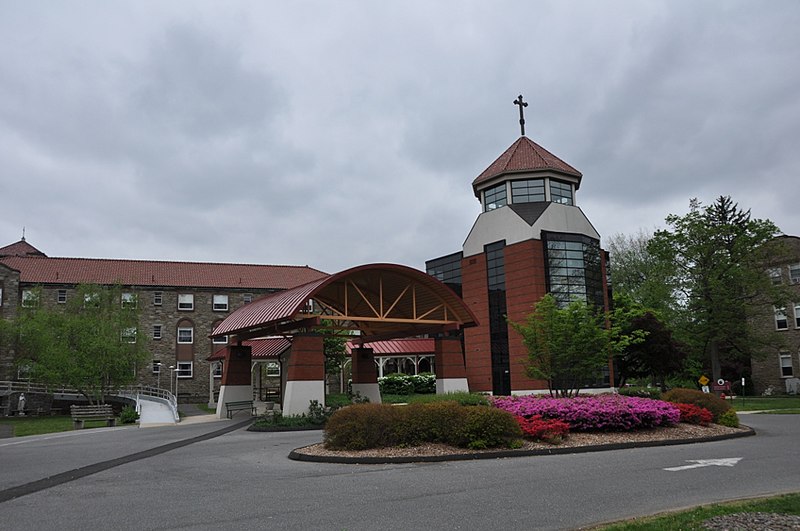Sisters of the Blessed Sacrament

Credit: User:Magicpiano
Licence: CC-BY-SA-4.0,3.0,2.5,2.0,1.0, via Wikimedia Commons
2012
| Giver: | Individual |
|---|---|
| Receiver: | Individual or unstructured/informal group |
| Gift: | Other |
| Approach: | Philanthropy |
| Issues: | 10. Reduced Inequalities |
| Included in: | Religious Giving, Social Activism |
The life of Katharine Drexel (1858-1955) illustrates how an individual possessed of courage, compassion and generosity can contribute meaningfully to the advancement of racial justice and equality.
Katharine Mary (originally Catherine Marie) Drexel was born in Philadelphia into one of the wealthiest and most prominent banking families in the United States. She was raised in an atmosphere of material comfort, devout Catholic faith and active philanthropy. Every year the Drexler family gave enormous sums to charitable causes, and Drexler’s stepmother, Emma Bouvier Drexler, regularly opened their home to serve the needs of the poor.
Educated at home by private tutors, Drexel found a mentor in the family pastor, Reverend James O’Connor, who helped guide her spiritual development. Drexel was also deeply affected by her stepmother’s death from cancer in 1883, an experience that awakened her to the inescapability of human suffering and prompted her to consider a religious vocation.
The following year, while traveling through the Western U.S., Drexel encountered Native Americans who had been forcibly removed from their tribal homelands and relocated to reservations as a matter of government policy. The sight of her fellow citizens living in extreme material poverty left an indelible impact on Drexel, and she became determined to aid their cause. In the years that followed, she also committed herself to confronting the economic and political struggles of African Americans, whose opportunities and civil rights were so severely curtailed by racial discrimination.
In 1885 Drexel’s father died suddenly, leaving her a sizeable fortune. She immediately began to use her inheritance to improve conditions on Native American reservations, building schools and providing food, clothing and other material support.
Inspired by a meeting with Pope Leo XIII in 1887, Drexel resolved to devote her life entirely to God. In 1891 she took her vows as a Catholic nun and founded the Sisters of the Blessed Sacrament, a congregation dedicated to serving Native American and African American communities by expanding access to education.
During her 35 years of ministry, Drexel used her fortune to establish 50 schools for African Americans and 12 schools for Native Americans throughout the American South and West. The most prominent of the educations institutions she founded is Xavier University of Louisiana, the first and only historically Black Catholic university in the United States.
Drexel died in 1955, but her legacy endures. In 2000 she was canonized by Pope John Paul II, becoming the second U.S.-born Catholic saint. Today, the Sisters of the Blessed Sacrament carries on Drexel’s mission to "challenge all forms of racism, as well as other deeply-rooted injustices."
Contributors: Maha Tazi, Erin Brown
| Source type | Full citation | Link (DOI or URL) |
|---|---|---|
| Publication |
Fossey, Richard, and Stephanie Morris. “St. Katharine Drexel and St. Patrick’s Mission to the Indians of the Southern Plains: A Study in Saintly Administration.” Catholic Southwest 18 (2007). |
- |
| Publication |
Hughes, Cheryl CD. Katharine Drexel: The Riches-to-Rags Life Story of an American Catholic Saint. Wm. B. Eerdmans Publishing, 2014. |
- |
| Publication |
Hurd, Nicole Farmer. The master art of a saint: Katharine Drexel and her theology of education. University of Virginia, 2002. |
- |
| Publication |
Fossey, Richard, and Stephanie Morris. “Courage Under Fire: St. Katharine Drexel and the Sisters of the Blessed Sacrament Confront the Texas Ku Klux Klan.” Catholic Southwest 21 (2010). |
- |
| Publication |
Tarry, Ellen. Saint Katharine Drexel: Friend of the oppressed. Ignatius Press, 20 |
- |